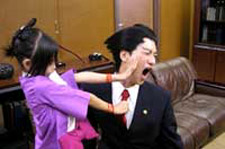I’ve been playing a lot of Phoenix Wright: Justice for All lately, and I’ve been finding quite a few references to TV shows. They have one from the Fresh Prince of Bel-Air series, as well as one from a current soap opera, which will remain nameless to conceal the fact that I know a thing or two about a soap opera.
 |
Now, I know some of you readers out there are hardcore RPG fans, and will probably get rubbed the wrong way from references like these. Something tells me that you would rather see more original jokes instead of some quote from a TV show. I personally have found no problem with this, but was wondering how everyone else felt on the subject.
It’s cool to see a game like Phoenix Wright talk about a TV show I grew up watching (not the soap opera), but on the other hand, it seems a little cheap to throw in some quick quote from a show, possibly crossing the border of funny to mainstream pop-culture that we all seem to hate.
So what would you rather have, original content created for games like Phoenix Wright, or a hearty helping of alluded content, like the ones mentioned? Maybe a combination of both?


[…] read more… […]
This sounds a bit like the debate between Working Designs etc. versus standard translations. I usually don’t care too much one way or the other, although the main plot (in RPGs) should avoid that kind of thing naturally.
this is a complicated question, since a lot of my answer would depend on what was in the original. if the japanese version makes a reference to japanese pop culture, then it probably makes sense to replace that with something i will understand when i play the game in english. otherwise, i am mostly opposed to having pop culture references in my games. your PW example isnt too malicious since the game takes place around the present day, so a fresh prince reference may make sense. if you are fighting dragons with swords and magic spells, that same refernce makes less sense.
Rogue Galaxy is kind of interesting in what it seems to be doing in its localization. There’s a scene where you meet this cute anime girl idol named MIO, who is adored by all and ends up taking pictures with some nerdy fans (who are also prison guards). In the American version, she’s presented as a valley girl who says things like "omg" out loud, and the two guards are presented as being quite ridiculous in their obsession. I have to wonder if in the Japanese version these two otaku like folk, and even MIO herself were presented in a much nicer light.
I’m not so sure they would be. Alana from Persona 1 was translated as a Valley Girl, but in the original she was a Kogal – a member of a fashion movement that involves flashy clothing, overdone makeup, dyed hair, expensive clothes, etc… And the otaku-like guards might’ve been parodies of otaku. Could be they were indeed more favorably portrayed originally, though. I’m actually hoping to pick up Rogue Galaxy soon myself.
I don’t mind humor as long as it’s tasteful and funny. So pop culture is fine, just don’t overdo it. If they can be exceptionally clever about placing it, especially in an RPG format, all the more props. My main concern is that pop culture, except for EXTREME pop culture (like LOTR, or Star Wars), won’t necessarily stand the test of time. Given how "old" RPGs are constantly being re-released, and the fact that "old" games can be easily delivered as downloadable content on new systems (look at Wii and Xbox Live), I think this is more of a concern now than ever. It’s wholly conceivably our kids in 20 years are playing PS3 and Wii games on the PS7 and Wii4, so I’d rather not appear old by having to explain to them what a power puff girl or who the Fresh Prince was. I’ll just end up coming across as old and uncool.
The problem with the Working Designs approach is that Clinton Administration jokes aren’t going to remain that funny ten years from now (this is just one example). Well, maybe they will to some folk who lived through the period, but the point is that it loses some of the timelessness. There are some comedies in film however that are both classics and timeless, and I think this is often because the jokes presented are based on common themes and jokes from really old history, such as Blazing Saddles, that we’ll all be familiar with. Also, humor that is mostly a string of pop culture references isn’t easy to make very funny.